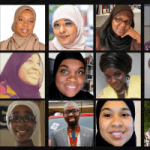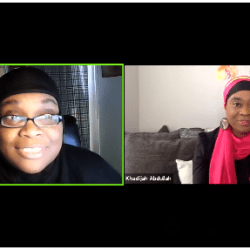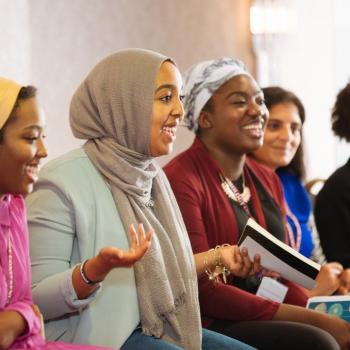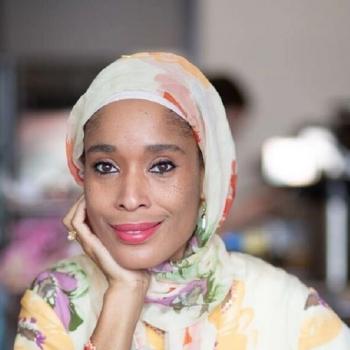
The holiday season in the United States seems to begin earlier every year. This year, people hastily took down their scary Halloween décor and replaced it with happy Christmas ones. Stores, offices, and other establishments pipe a steady stream of holiday songs, and almost everyone purses their lips to let out a constant refrain of “Happy Holidays!” Consequently, for many American Muslims, the season is saturated with pressures (including from inside some Muslim communities) to participate in events and activities that may result in making compromises to their faith.
However, highlighting the Muslim celebration dilemma is not the objective of this article. To do that would mean feeding into a thematic “Muslims at Christmas” preoccupation with the holidays. Annually, there is an increasing roster of published articles with a din of rantings about why American Muslims should or should not chop down trees, hang up lights, or lie to their children about a magical White man with gifts. They play out like a tone-deaf refrain of “Muslim Christmas songs,” dysfunctional in the centering of a Christian holiday. All of the indignation and tirades overlook how each plays a role in subverting the construction of a stable American Islamic culture that will be strong for generations to come.
Before asserting that it isn’t a big deal, rest assured that it is, and here are a couple of reasons why…
It’s Not about the Damn Tree

A familiar chorus in the articles comprising the “Muslim Christmas songs” invariably includes an oversimplification of engaging in holiday season activities. It’s always the same, “my family,” “its secular,” “only the non-Christian parts,” etc. Additionally, there is the steady stream of, “pagan rituals,” “bidi’ah,” “imitation of kuffar, etc. Each is resolved in their stance but ignores how they are highlighting a holiday that should be as inconsequential as others during this time of year.
Despite the existence of other holidays like Hanukkah and Kwanzaa, the myriad of Muslim articles consistently focus on Christmas as well as activities correlating to the holiday, even those in secular or non-religious camouflage. The fixation on trees, lights, presents, and a big fat fallacy in the form a White man with the privilege of breaking into homes demonstrates how successful the cultural indoctrination and subjugation of American Muslims is. If the fight to celebrate (or not) was really about an all-inclusive civic celebration, then American Muslims would stock their homes with dreidels, kikombe cha umojas, and defend lighting menorah and kinara.
Considering the apparent erasure of those celebrations from the litany of “Muslims and The Holiday” articles bombarding social media, it is safe to conclude that it is Christmas at the foundations of the “Muslim Christmas songs” and not some “secular-communal” celebration. Consequently, Eurocentric, Christian-centric intrigues to dominate national holidays by getting non-Christians to participate is sadly successful in the American Ummah. These arguments put Islamic worship by its adherents on the defensive side of a cultural dialogue that helps culturally subjugate Muslims through their preoccupation.
Muslims either struggle to maintain spiritual orthodoxy in their faith or jam manufactured trappings into it, choosing to treat as an ethnic identity. Consequently, the American Muslim Ummah remains destabilized and its members appear unable to establish and maintain spiritual confidence. One typically does not see a barrage of articles asserting why Christians should or should not celebrate Ramadan. There are many reasons for the absence of such writings, one being the placement of Christianity as the dominant religion with a history of absorbing adherents of other faiths via feigned secular civic celebrations with ever-present Christian undertones.
All of the harping of “Muslim Christmas songs” also fosters a ruckus of squabbling about individual inclinations and aversions, diverting everyone from some pretty bigly social issues.
Fighting over Lights but not for the American Ummah

In-fighting about non-Muslim holidays and celebrations that quite frankly have nothing to do with the Deen produces a venue for argumentation, fortifying the persistent existence of tensions and preventing true cohesion in the American Ummah. It also reduces conversations about the faith to personal interpretations, catering to an American individualism approach when applying the faith as well as the need for the broader society to keep Muslims focused on bickering instead of larger issues threatening our well-being.
American Muslims have quite a laundry list of societal issues. Here are 20:
- Police Brutality
- Domestic Violence
- Targeting Muslim Women
- Muslim Registry
- Disability Awareness and Inclusion
- Systemic Racism and anti-Blackness
- Intra-Cultural Racism and anti-Blackness/Colorism
- Poverty
- Homelessness and Housing
- Counter Violent Extremism (CVE)
- Mental Health
- Monsanto and better eating and farming practices
- Water Protection (#nodapl)
- Victims’ Rights
- National Security Entry-Exit Registration System (NSEERS)
- Immigration Reform
- Refugee Support
- Education
- Medicaid
- Mosque/Community Security
Considering the above issues, the others not listed, and the ushering in of a presidency with a Commander and Chief who is not shy to express his plans for the internment/extermination of the American ummah, there is no room for us to tune into the Muslim Christmas song cacophony.
Note: We live in a society that actively seeks to extinguish semblances of Islam in the culture and marginalize our faith while some of us struggle to justify the inclusion of their rituals in American Islam – a prime example of cultural subjugation.












